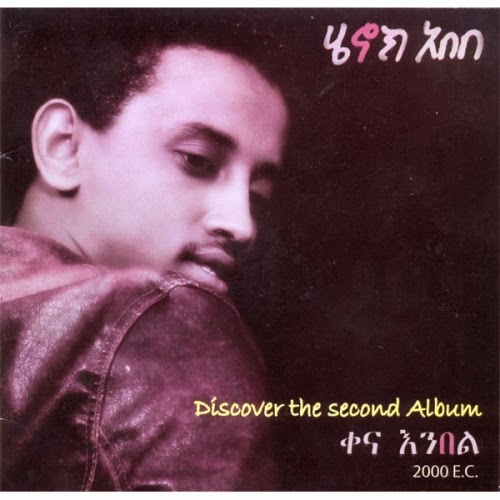Yehunie Belay (Amharic: ይሁኔ በላይ, born December 9, 1961) is an Ethiopian singer, musical writer and entrepreneur.
At an early age, his exceptional musical talent got first exposure in the local kola Dega Damot regional talent group. It was in this group that Belay expanded his musical repertoire, learning among others, the unique styles of the Shankila ethnic group. In fact, Belay’s artistic talent was discovered at early age before he joined the Gojjam Gish Abay Cultural Group with whom he is famously known for.
His first album, Yagere Lij Bal Game was a hit, but it was his second back-to-back hit album Ere Ney Gibe Gibe that earned him a spot among Ethiopia’s renowned folk singers.
Starting from his debut in 1987, Belay has risen to become a cultural ambassador of Ethiopia and Ethiopians performing to his fans throughout the world. In addition to his two single hit songs titled "Bahir Dar" released in 2013 and "Yegodelegne ale-Bezoro" that was released in 2011, Artist Yehunie has released six albums to his credit.
Yehunie Belay was born to his Father Mr. Belay Melese, a farmer and a patriot of the people in the western part of the country known as Gojjam, and to his mother Mrs. Tadefalech Eneyew who was house wife raising taking care of three children including Yehunie. He started his early education in what is called Kes Temheret Bet attending from the age of four to seven. Then he joined Fenote Selame Kedamawe Haile Selassie Elementary School and further completed his secondary school in the year 1986 from Damote Comprehensive Secondary high school. Yehunie’s musical talent got its first exposure in the local kola Dega Damot regional talent group. In this group he expanded his musical repertoire, learning the unique signing & dancing styles of the Amhara, Benishangul gomez, Agaw and Oromo ethnicities. Artisit Yehunie’s musical richness at expressing the art of Ethiopia’s ethnicities is clearly displayed on his all- in-one unique song “Yangatom” that has a message of oneness and togetherness of all nations and nationalities.
Yehunie’s professional musical career started in the year 1986 when he was recruited into the Gojjam Gish Abay Cultural Group, a professional troupe that was touring Ethiopia throughout the 80's and 90's. It was after his very first televised performance of “Antuyewa” an authentic and original dramatic musical act that the name Yehunie Belay became a household trademark throughout the whole of Ethiopia. His success came as a result of hard work and strong dedication developed by mastering the art of music. To turn out and become as excellent exceptionally talented musician as he is now, Yehunie has to go through a refinement process through different stages beginning from Kebele (local) level, Woreda (district), Aweraja and finally to Kifle Hagre (state) level.
His first album “Yagere Lij Bale Game” a sensational hit, followed by his second back to back hit album “Ehe Na Na Hoy ena” and further release of “Ere Ney Gibe Gibe” on his third album release earned Artist Yehunie a spot among the few and the best Ethiopia’s renowned folk singers. His fame extended farther into the Ethiopian Community of the US, Europe and the Middle East.
After moving to the US in the early 90’s, Artist Yehunie yet released other hit albums like “alo lulo”, “Kuku Melekote”, “be-be Kefilaw”,“Yeman Nesh Wubetaw (Zegelila)”, Classic Collections and “Zengena”. Recently in the year of 2011, Artist Yehunie has released special Easter single song “Yegodelegne ale” for his fans all over the world. In this self-created and self-inspired sweet song, artist Yehunie sings about the love of his country- Ethiopia, its people, its great culture and way of life. Artist Yehunie Belay is not only a singer and performer but also an executive director of the Ethiopian Yellow pages Inc., a Washington DC based online & yellow pages publication and also Editor in chief of Bawza, an Amharic English newspaper publication. Yehunie seizes every opportunity to devote his time to promote the interests of the Ethiopian community in the US.
Yehunie Belay - Guzara
02 - Yehunie Belay - Guzara (6:28)
03 - Yehunie Belay - Mesganaw Deg New (5:03)
04 - Yehunie Belay - Meshelem (6:19)
05 - Yehunie Belay - Betachin (5:44)
06 - Yehunie Belay - Endanchi Miyamer (6:13)
07 - Yehunie Belay - Siyamir Chewataw (7:00)
08 - Yehunie Belay - Hay Mulo (5:18)
09 - Yehunie Belay - Lisamish (6:23)
10 - Yehunie Belay - Dinye (4:51)





.jpg)











